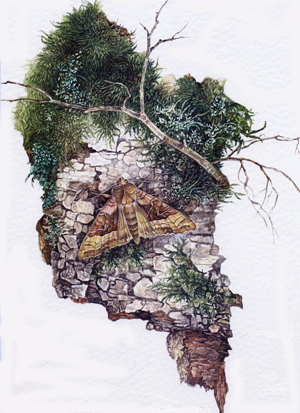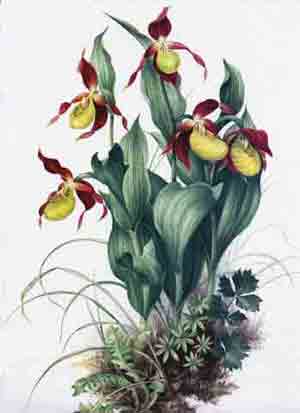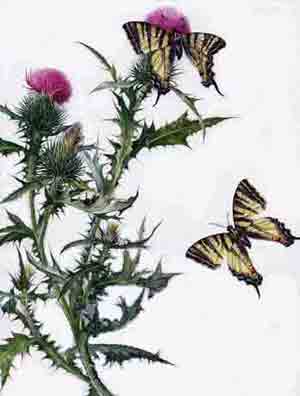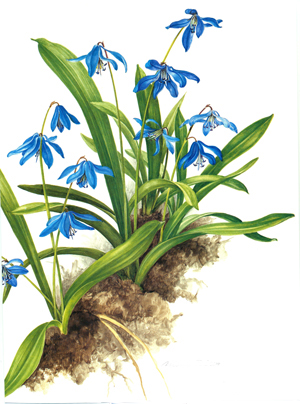planta-, plant-
(Latin: sole of the foot; to tread down with the sole or the flat bottom or the underside of the foot; and by extension, to level the ground for sowing seeds)
2. Certain kinds of greenery that have adapted to living in or on water environments: The aquatic plants along the side of the river appeared to be water hyacinths.
This "plant" reference is apparently linked to the action of pressing on a shovel, or some other tool, with the "sole of the foot" in order to work the soil for planting.
Plant geography has emphasized the mapping of such regions and the interpretation of the terms of environmental (ecological) influences.
The areas of phytogeography and zoogeography do not necessarily exist together in the same place, because there are barriers and factors that affect their growth and arrangements which are often different for plants and for animals.
Like other related "plant" references, this entry is apparently linked to the action of pressing on a shovel, or some other apparatus, with the "sole of the foot" in order to work the soil for the development of plants.

Plants are also different from animals by generally responding to external stimuli very slowly and the responses often take a matter of days and only occur when the stimuli are continued for long periods of time.
Plants are necessary for the continuation of life on Earth and they are an essential part of the food chain, supplying energy and oxygen for the higher, more complex forms of life.
Not all of the plants produce their nutrition by photosynthesis because some are parasites on other plants, and a few of them are carnivorous in that they specialize in capturing and digesting insects.
2. Vegetation that covers the earth and determines the appearances of the landscapes: There are divisions that are caused by the tendency of certain communities of plants to be unified in groups.Of all of the factors that affect land plants, the most important is water, the abundance and availability of which is again influenced by the structure of the soil.
Plants store food in the form of starch; and their cell walls are made mostly of cellulose.

Although plants can't run away, some of them can defend themselves by secreting bitter substances which give off an unpleasant taste to their leaves and fruit; others defend themselves with acids and poisons, with nauseating milky fluids, that have stinging hairs, prickles, thorns, and crystal needles.


Scientists have estimated that there are 400,000 species of plants, with Columbia, Ecuador, and Peru having more plant species than any other country in the world.
3. A place where industrial or manufacturing processes take place: Machinery is used in plants that make cars and other vehicles.The meaning of this English noun plant is not known; however, it apparently developed after the classical Latin period and is linked with the action of pressing on a shovel, or some other tool, with the "sole of the foot" in order to work the soil for planting.
The Latin
5. A person who has been placed in a group as a spy or an informer by another organization: Helena's cousin became a plant in an opposing political organization and, as such, she was able to record a video of a statement made by the candidate which was used against him in a political debate.
6. Etymology: from Old English plante, "young tree or shrub, herb newly planted"; from Latin planta, "sprout, shoot, cutting"; perhaps originally from plantare, "to drive in with the feet, to push into the ground with the feet"; from planta, "sole of the foot".
2. To place seeds or undeveloped foliage in the soil to produce crops: Farmers around the world are planting various kinds of food products so the rest of the world can be nourished and live better.
3. To establish an idea, etc. in a person's mind: The politician was planting seeds of doubt about his political opposition during a speech that was being broadcast on the radio.
4. To hide an explosive that is set to go off later: Fortunately, the police were able to arrest the terrorist before he could set off the bomb that he had planted in a car that was parked in the city.
5. To secretly place or conceal something among people's possessions in order to suggest that they are guilty of a crime: Greg planted some stolen goods in Shanna's unlocked car while she was returning a grocery cart so he could get some money as a bribe from her to keep him from telling the police.
6. To send someone to join a group or an organization to act as a spy or an informer: Mary found out that James, one of her coworkers, was an agent who had been planted in her administrator's office staff by a rival company.
Research in biofuels is striving to refine plant cellulose in the form of corn husks instead of corn kernels, bagasse (dry dusty pulp that remains after juice is extracted from sugar cane) instead of cane sugar, and agricultural and industrial wastes of all kinds; such as, wood chips, the remains of paper mills, and fallen tree leaves.
Many creatures, including termites and cattle, use gut microbes to break down plant cellulose in their digestive systems where microbes do it by secreting enzymes called cellulases.
As small as they are, plant lice are big pests of many fruit trees and vegetable crops.
"The challenge to plant pathology is just beginning to take on a worldwide significance as the race intensifies to produce more, and more wholesome, food while still safeguarding our environment."
In agreement with the major characteristics of organisms plant physiology is usually divided into:
- The nutrition and metabolism of plants that deals with the uptake, transformations, and release of materials, and also their movements within and between the cells and organs of the plant.
- The environment of plants which strives to understand the various responses of plants to the environment.
- The part of the environment that deals with the effects of and adaptations to adverse conditions is called stress physiology.

